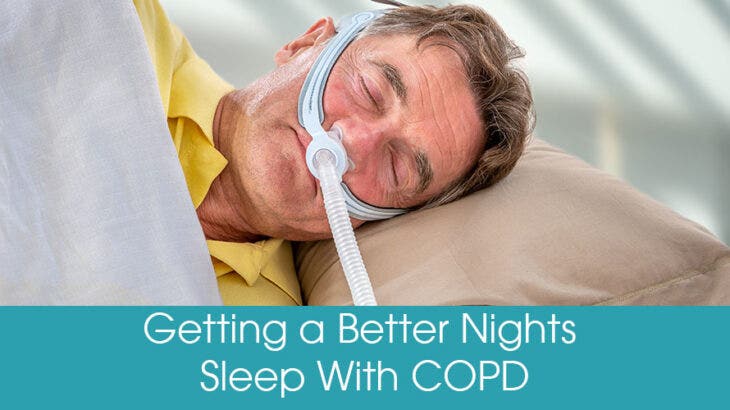Losing sleep is one of the unfortunate effects of COPD, and one that can cause more problems down the road if you ignore it. Sleep is extremely important to every aspect of health, especially our immune systems. You do most of your recuperating and healing during sleep. If you have recently suffered even a mild exacerbation, you’re likely to feel even more worn down and in need of a good nights rest.
If you are able to get the amount of sleep you need on a regular basis, your immune system will work the way it’s supposed to, which will help prevent the illnesses that are responsible for most COPD exacerbations.
Many people with COPD of different severity will have trouble sleeping at night. They might wake up at different times of the night, or they might be unable to fall completely into the deepest stages of sleep, which are the most important. They might experience trouble breathing and need to use an inhaler, or might just feel too restless and out-of-sorts to sleep, which is another symptom of COPD. Worries and anxieties can also be the culprit of insomnia.
When you can’t achieve deep sleep, many things suffer. We already know that your immune system’s ability to resist and fight off illnesses is compromised, but you are also more susceptible to depression and memory loss. The stages of deep sleep that we are supposed to get every night are responsible for storing memories and things learned while we are awake. If you’re not breathing correctly and waking up often during the night, your mind becomes run down, along with the rest of you.
Things You Can Do to Help You Sleep
The first thing you should do is talk to your doctor. He or she might help you find out that something else entirely is keeping you up at night. The problem might not be COPD, but the additional and not necessarily related problem of sleep apnea. If you have a moderate to severe case of sleep apnea, you might need to use a CPAP machine. A CPAP machine releases a flow of air through a face mask that you wear while you are sleep, to keep your airways open and unobstructed.
If the possibility of sleep apnea has been ruled out for you, your doctor might decide that you need to use oxygen therapy only when you are sleeping.
An additional reason you can’t sleep, besides the symptoms COPD itself, is having too much on your mind and not being able to relax. If you find yourself thinking and worrying about your medical bills or your condition, try using relaxation techniques such as meditation or deep breathing exercises.
To help you relax, make sure your bedroom is dark and cool and the air is neither too dry or too moist. Excessive dryness in the air will cause you to wake up coughing with a dry throat and needing a glass of water, which will then cause you to wake later on to go to the bathroom. Place a clean humidifier in the room with you while you are sleeping, even if you are using oxygen therapy at night with a humidifier on the machine.
Information on this page is for reference and educational purposes only. For more information about COPD, talk to your doctor or primary care provider.
Scott joined American Medical Sales and Rentals in 2008 as a Web Manager and Content Writer. He is a writer and designer. He is extensively trained on oxygen therapy products from leading manufacturers such as Inogen, Respironics, Chart, Invacare, ResMed and more.
Scott works closely with respiratory therapists and oxygen specialists to educate the community about oxygen therapy products, COPD, asthma and lung diseases. He writes weekly columns and is passionate about educating the community on oxygen therapy and respiratory issues.





